Scots’ spending expected to be hit by Brexit fears - PwC
Scottish consumers are among the most concerned about the economic impact of Brexit, but more than half the population still don’t believe the UK’s exit from the European Union will change their spending habits.

The findings in PwC’s 2019 Retail Outlook reveal that a quarter of Scots (24 per cent) said their spending habits were affected by Brexit in 2018, with a further 22 per cent expecting to cut back this year.
While the majority (54 per cent) believe their spending won’t be impacted by Brexit, the nationwide study across Great Britain reveals the only areas more concerned about Brexit are London and Wales. In contrast, 70 per cent of people in the North East of England believe there will be no impact on their spending habits.
Fears are accelerating in Scotland, with the 22 per cent who believe their habits will change in 2019 the highest of the 11 GB regions polled.
Last year, the balance between those who did think Brexit would impact their spending (24 per cent) and wouldn’t (76 per cent) was 53 per cent. When looking to 2019, this balance has closed to 9 per cent, a change of 43 percentage points, well ahead of the 25pp across GB overall.
The findings also show that a third of Scots (32 per cent) believe they will be worse off in 2019 than last year, while 23 per cent believe they will be better off. Of those who believe they will be worse off, 35 per cent put this down to being less confident in the economy.
Claire Reid, head of retail for PwC in Scotland, said: “Having voted to remain in the EU, it is unsurprising to see that Scots are among the most concerned about the economic impact of Brexit. While these fears are accelerating, the mood may shift if the UK manages to secure a deal with the EU and create more certainty in people’s minds, but as it stands, we do expect to see more people tighten their belts this year.
“The fears come despite median earnings in Scotland increasing last year by 3 per cent. Even accounting for inflation, consumers do have more money in their pockets than the previous year. What we are seeing however, is that they are becoming increasingly careful about where that money is being spent.”
The study asked people across Scotland how their shopping habits would change across 13 categories, with more expensive categories the most likely to be hit by reduced consumer confidence. Restaurants and bars are also expected to see reductions.
Grocery was the only category where more people plan to increase their spending than will cut back.
In total, 37 per cent said they would be spending more on grocery shopping in 2019 compared with 2018, while 14 per cent said they would spend less, giving a balance of +23 per cent.
“Big ticket items”, technology and eating out all had a balance of -20 per cent, meaning more people will reduce their spending than will increase it.
PwC previously reported an acceleration in the number of retail shops closing across Scotland’s high streets, and business owners face further pressure with spend on fashion expected to fall in 2019.
Almost one-in-three people said they would spend less on clothing, shoes and accessories. More than a third (35 per cent) said they would make fewer purchases while 22 per cent said they would go shopping less often. One in five said they would buy more sale items.
This points to UK retailers having to quickly adjust to the ‘new normal’ of subdued trading, where the only way to achieve growth is by taking market share away from other players and adapting to the more conscientious shopper.
The 2019 Retail Outlook highlights three areas where retailers need to focus in order to increase their market share. Investing in technology, specifically using artificial intelligence and data analytics to aid decision making and improve customer experience; increasing efficiencies across operating systems by transforming supply chains with the use of digital technologies to save costs; and reviewing their corporate structure to explore if M&A, divestments or partnerships/collaborations can improve their health.
Ms Reid adds: “We are already seeing an increase in the number of store closures and the high street continues to face huge challenges with consumers planning to reduce their spend in 2019. With sluggish growth forecast this year, the findings show retailers must become increasingly competitive to maintain their market share.
“With people going shopping less frequently and reducing the amount they plan to spend, retailers must come up with new ideas to win the battle for precious fashion pounds. That means quickly adapting to emerging trends such as the ‘better connected’ consumer. This means investing in the likes of artificial intelligence and data analytics to provide an increasingly personalised service.”
Jason Morris, PwC’s head of deals in Scotland at PwC, said: “Retail growth in 2019 will be about winning share and taking a fresh look at your corporate structure or considering M&A activity offers the opportunity to drive market share upwards during a relatively flat economy.”
“Even in the current climate, which is seeing unprecedented changes across Scottish high streets, M&A and divestment activities remain fundamental for retailers.
“In Scotland specifically, we are seeing evidence of businesses using M&A to adapt to the market. For example, Dobbies has reshaped its garden centre portfolio with the acquisition of a number of large centres from Wyevale and the disposal of two smaller centres.”
The data indicate that consumers are also increasingly planning for the future. While less money will be used to boost savings and investments overall as a result of the Brexit Effect, we can expect sharper reductions in the likes of beauty and personal care spend over 2019.





